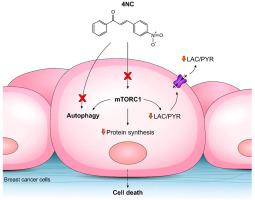Chemico-Biological Interactions ( IF 4.7 ) Pub Date : 2023-11-06 , DOI: 10.1016/j.cbi.2023.110790 Claudia Martins Galindo 1 , Letícia Milani 1 , Lucas Trevisan França de Lima 2 , Eliana Rezende Adami 1 , Simei Go 3 , Lucia de Noronha 4 , Olair Carlos Beltrame 5 , Giseli Klassen 2 , Edneia Amancio de Souza Ramos 2 , Ronald P J Oude Elferink 3 , Alexandra Acco 1

|
Breast cancer is a high-magnitude public health problem, continually challenging physicians and scientists worldwide in the field of drug therapy. 4-nitrochalcone (4NC) is a phenolic compound that has promising antitumor activity in vitro, but its application in breast cancer treatment is still poorly explored. This study aimed to evaluate the action of 4NC in vitro and in vivo breast cancer models. The cytotoxic potential of 4NC was tested towards MCF-7 and MDA-MD-231 breast cancer cells, with a lower impact in the non-tumor lineage HB4a. For in vivo studies, solid Ehrlich carcinoma (SEC) was used, a syngeneic mouse model with non-nuclear estrogen and progesterone positivity, characterized by immunohistochemistry. Daily oral administration of 4NC (25 mg kg−1) for 21 days led to a consistent reduction in tumor growth compared to the vehicle group. No signs of toxicity evaluated by hematological, biochemical, histological, and oxidative stress parameters were observed in mice, and the DL50 was >2000 mg kg−1. The effectors Raptor and S6K1 showed decreased activation, with a consequent reduction in protein synthesis; concomitantly, there was an increase in LC3-II levels, but the protective autophagic response was not completed, with the maintenance of p62 levels and cell death. These results open new possibilities for the use of 4NC as a tumor cell metabolism modulating agent.
中文翻译:

4-硝基查尔酮作为非临床乳腺癌研究的潜在药物
乳腺癌是一个严重的公共卫生问题,不断地挑战着全世界药物治疗领域的医生和科学家。 4-硝基查尔酮(4NC)是一种酚类化合物,在体外具有良好的抗肿瘤活性,但其在乳腺癌治疗中的应用仍鲜有探索。本研究旨在评估 4NC在体外和体内乳腺癌模型中的作用。测试了 4NC 对 MCF-7 和 MDA-MD-231 乳腺癌细胞的细胞毒性潜力,对非肿瘤谱系 HB4a 的影响较低。对于体内研究,使用实体艾氏癌(SEC),这是一种具有非核雌激素和孕激素阳性的同基因小鼠模型,通过免疫组织化学进行表征。与媒介物组相比,每天口服4NC(25 mg kg -1 )21天导致肿瘤生长持续减少。在小鼠中未观察到通过血液学、生化、组织学和氧化应激参数评估的毒性迹象,并且DL 50 >2000 mg kg -1 。效应子 Raptor 和 S6K1 的激活减少,从而导致蛋白质合成减少;与此同时,LC3-II 水平增加,但保护性自噬反应尚未完成,p62 水平维持不变,细胞死亡。这些结果为 4NC 作为肿瘤细胞代谢调节剂的使用开辟了新的可能性。






























 京公网安备 11010802027423号
京公网安备 11010802027423号